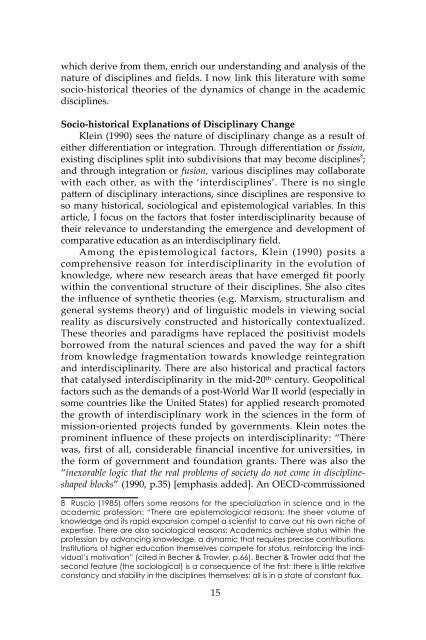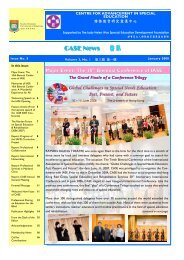Comparative Education Bulletin - Faculty of Education - The ...
Comparative Education Bulletin - Faculty of Education - The ...
Comparative Education Bulletin - Faculty of Education - The ...
Create successful ePaper yourself
Turn your PDF publications into a flip-book with our unique Google optimized e-Paper software.
which derive from them, enrich our understanding and analysis <strong>of</strong> the<br />
nature <strong>of</strong> disciplines and fields. I now link this literature with some<br />
socio-historical theories <strong>of</strong> the dynamics <strong>of</strong> change in the academic<br />
disciplines.<br />
Socio-historical Explanations <strong>of</strong> Disciplinary Change<br />
Klein (1990) sees the nature <strong>of</strong> disciplinary change as a result <strong>of</strong><br />
either differentiation or integration. Through differentiation or fission,<br />
existing disciplines split into subdivisions that may become disciplines 8 ;<br />
and through integration or fusion, various disciplines may collaborate<br />
with each other, as with the ‘interdisciplines’. <strong>The</strong>re is no single<br />
pattern <strong>of</strong> disciplinary interactions, since disciplines are responsive to<br />
so many historical, sociological and epistemological variables. In this<br />
article, I focus on the factors that foster interdisciplinarity because <strong>of</strong><br />
their relevance to understanding the emergence and development <strong>of</strong><br />
comparative education as an interdisciplinary field.<br />
Among the epistemological factors, Klein (1990) posits a<br />
comprehensive reason for interdisciplinarity in the evolution <strong>of</strong><br />
knowledge, where new research areas that have emerged fit poorly<br />
within the conventional structure <strong>of</strong> their disciplines. She also cites<br />
the influence <strong>of</strong> synthetic theories (e.g. Marxism, structuralism and<br />
general systems theory) and <strong>of</strong> linguistic models in viewing social<br />
reality as discursively constructed and historically contextualized.<br />
<strong>The</strong>se theories and paradigms have replaced the positivist models<br />
borrowed from the natural sciences and paved the way for a shift<br />
from knowledge fragmentation towards knowledge reintegration<br />
and interdisciplinarity. <strong>The</strong>re are also historical and practical factors<br />
that catalysed interdisciplinarity in the mid-20th century. Geopolitical<br />
factors such as the demands <strong>of</strong> a post-World War II world (especially in<br />
some countries like the United States) for applied research promoted<br />
the growth <strong>of</strong> interdisciplinary work in the sciences in the form <strong>of</strong><br />
mission-oriented projects funded by governments. Klein notes the<br />
prominent influence <strong>of</strong> these projects on interdisciplinarity: “<strong>The</strong>re<br />
was, first <strong>of</strong> all, considerable financial incentive for universities, in<br />
the form <strong>of</strong> government and foundation grants. <strong>The</strong>re was also the<br />
“inexorable logic that the real problems <strong>of</strong> society do not come in disciplineshaped<br />
blocks” (1990, p.35) [emphasis added]. An OECD-commissioned<br />
8 Ruscio ( 985) <strong>of</strong>fers some reasons for the specialization in science and in the<br />
academic pr<strong>of</strong>ession: “<strong>The</strong>re are epistemological reasons: the sheer volume <strong>of</strong><br />
knowledge and its rapid expansion compel a scientist to carve out his own niche <strong>of</strong><br />
expertise. <strong>The</strong>re are also sociological reasons: Academics achieve status within the<br />
pr<strong>of</strong>ession by advancing knowledge, a dynamic that requires precise contributions.<br />
Institutions <strong>of</strong> higher education themselves compete for status, reinforcing the individual’s<br />
motivation” (cited in Becher & Trowler, p.66). Becher & Trowler add that the<br />
second feature (the sociological) is a consequence <strong>of</strong> the first: there is little relative<br />
constancy and stability in the disciplines themselves: all is in a state <strong>of</strong> constant flux.<br />
15
















